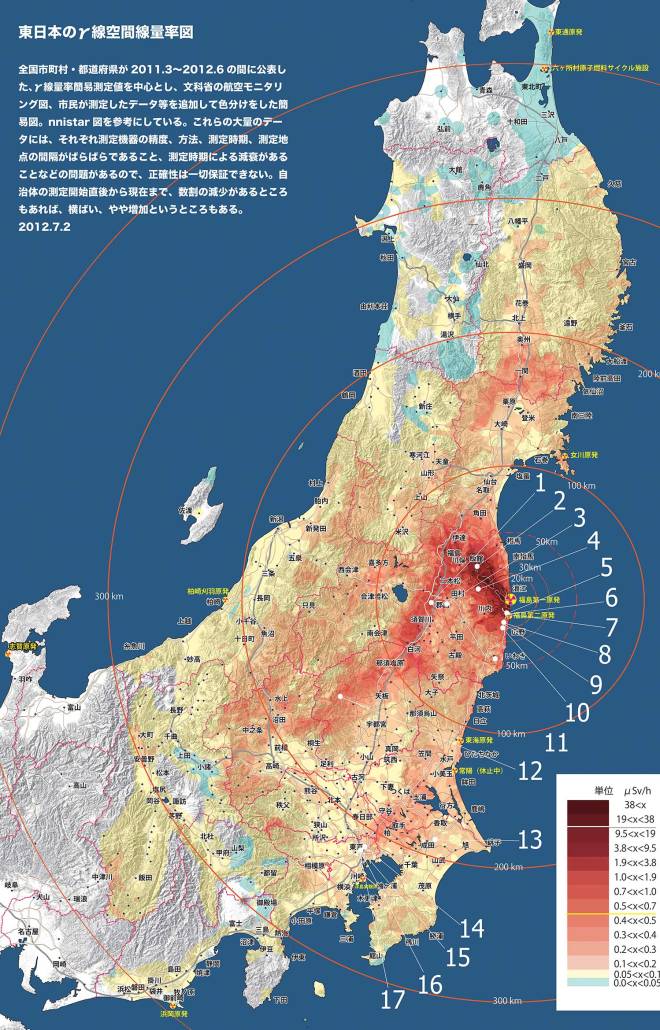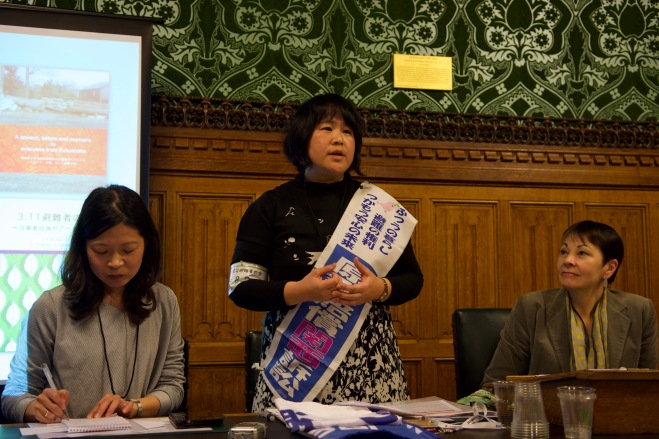Asami Yokota, a Fukushima mother who remained in Koriyama city while her son evacuated to Hokkaido, gave the following speech at the Remember Fukushima Parliamentary public meeting, in the House of Commons, Westminster, London, on 19 March 2019:
Rough transcript:
“My son, who was thirteen years old at the time of the nuclear explosion, turned twenty one while living in Hyogo prefecture, near Osaka, 800 km away from Fukushima.
I myself have always lived in Koriyama City in Fukushima, which is only 65km away from the [nuclear] power plant, where I have been running a small café.
The earthquake shook buildings and the aftershocks continued into the night.
The evacuation order was initially announced for residents within a 3km radius [from Fukushima Daiichi nuclear power plant]. Within a 10km radius it was suggested that residents stay at home.
My family spent a night in fear, while preparing to run away at any time, just in case. My son, who had knowledge of nuclear power, was unwilling to go outside.
Then my family evacuated to my relatives’ house in Aizu region (western Fukushima). However our home area wasn’t included in the evacuation area and when the school reopened we had to go back to Koriyama city. My son used to use a bicycle to go to school, but I started to take him by car. To avoid radiation exposure, my son kept wearing long sleeves, long trousers and masks as well as goggles, even in the hot summer days, which made him look very strange compared to others.
Gradually my son refused to attend school since everybody pretended everything was normal just it had been before, without knowing the accurate levels of radioactivity. If the Japanese government had given accurate information about radiation more people could have avoided radiation exposure. Besides, the actions our family took would have been understood I think.
Since October 2011, [in order] to dispel the bad reputation about Fukushima [produce], elementary schools and junior high schools started using rice and vegetables which were grown in Fukushima after the explosion. My son was concerned about internal exposure to radiation so he refused to eat school meals.
My son wanted to get out of Fukushima but there was no shelter for a single [unaccompanied] child.
I also wanted to help my son to get out and I took him for a recuperation at a centre in Hokkaido. Then he decided to move to Hokkaido when he graduated from junior high school.
He felt like a sort of domestic exile: there was no other case of a single [unaccompanied] child getting away from Fukushima for recuperation.
I am still living in Koriyama City but I don’t want to stay there any longer as none of the issues regarding nuclear radiation exposure have been resolved yet.
I feel some [other] people also want to evacuate from Fukushima or move to other places. I don’t know when and where to move: I hope some place can accept us. My son was lucky as there was a place which welcomed him when he moved there. Therefore I think it is important to have a sense of safety by having the option to move.
While I’m staying in Fukushima, I have to avoid internal exposure [to radiation] as much as I can. I used to buy vegetables at my local farmers [market] near my café. But I stopped going, instead trying to buy food from places faraway from Fukushima.
Right after the explosion, some shipping of Fukushima produce was suspended due to the radioactive contamination. Now most of the produce is being shipped based on the dose of radioactivity [it contains]. Most people believe that the shipped food is totally safe but I’m highly suspicious of it.
We can buy safe food and clean water, even though they are pricey. We can’t buy safe air, however. Many people argue that the food produced in Fukushima is totally edible. However I think the freedom of choice about whether to eat it or not is most important. In order to protect myself from internal exposure I will continue this habit.
Many people insist that to question the reputation of Fukushima produce [is wrong] and that its recovery is positive.
Most people categorise the people who care about radiation and internal exposure, like me, as negative. Therefore I’d like to be a helpful person for those who believe in Fukushima [radiation danger] but can’t really speak their fear and worries in front of others.
Thus I will keep talking about this matter in my café, listening to the others, as well as giving them advice to help them feel reassured.
Recently some old friends of my son who are now over 20 years old asked him “is it possible to get married?” or “can we have a baby?” based on their fear of [their] exposure to radiation.
I don’t think it wrong to either respond to the radiation seriously like we do, or to pay no attention to it. In my case, me and my son are doing this in order to not feel regret in the future.
Even the intellectuals and researchers are polarized with opposite opinions. Therefore I think “what do I decide?” What I think is right is more important that what is right.
We are getting used to living with radiation, which is invisible, odourless and therefore only detectable via the numerical data of air radiation doses which are broadcast on TV in Fukushima every day.
I felt it was strange in the beginning but now we are getting used to it. Regarding the decontamination people have started to think it is fine for the contaminated soil to be buried in the gardens next to their homes, or in parks.
Now they have begun to relocate the contaminated soil to a temporary place in Fukushima. The staff who used to wear to protective suits now do decontamination work without wearing masks. I think that its invisibility and odourlessness causes people to forget about the risk of radiation.
Now eight years have passed and I spent the night of 11thMarch in France. I recall the beginning of the nuclear disaster and believe that it is still continuing: it hasn’t finished at all.
People who think about nuclear power, radiation and radioactive exposure are seen as troublemakers or outsiders in Japan nowadays, including my family. Thus I am very honoured to be hear to speak out the truth which has been marginalized and ignored on the news in Japan.
Thank you so much for your listening.”



